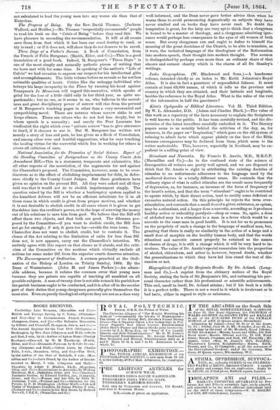Stiinulants and Narcotics. By Francis E. Anstie, M.D., M.R.O.P. (Macmillan
and Co.)—As to the confused state of the science of therapeutics all writers are pretty well agreed, and we are disposed to think that Dr. Anstie is right in attributing the existing doctrine of 'stimulus to an unfortunate adherence to the language used by the medinval doctors in a totally different sense. He contends that the ordinary signs of what is called stimulus are the result more frequently of depression, as, for instance, an increase of the force of frequency of the heart's action, and that the term "stimulant" ought to be restricted to agents which, by their direct action, tend to rectify some deficient or excessive natural action. On this principle he rejects the term over- stimulation, and contends that a small dose of a given substance, as opium, may be a stimulant, and a larger dose a narcotic, according as it produces healthy action or unhealthy paralysis—sleep or coma. So, again, a dose of alchohol may be a stimulant to a man in a fever which would be a narcotic to the same man in good health. It is not for us to pronounce on the propriety of such a change in the language of medical men, but, granting that there is really no similarity in the action of a large and a small dose of morphia on the healthy human body, and that the words stimulant and narcotic cannot properly be retained as the names of classes of drugs, it is still a change which it will be very hard to-in- troduce. The value of Dr. Anstie's special researches into the properties of alcohol, chloroform, and tether is, however, beyond doubt, whether the generalizations to which they have led him stand the test of dis- cussion or not.






























 Previous page
Previous page